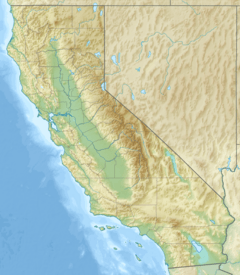Carriger Creek (Sonoma County, California) facts for kids
Quick facts for kids Carriger Creek |
|
|---|---|
| Country | United States |
| State | California |
| Region | Sonoma County |
| City | El Verano, California |
| Physical characteristics | |
| Main source | Sonoma Mountain 4 mi (6 km) southwest of Glen Ellen, California 2,160 ft (660 m) 38°19′34″N 122°34′24″W / 38.32611°N 122.57333°W |
| River mouth | Fowler Creek (below) 49 ft (15 m) 38°16′0″N 122°28′33″W / 38.26667°N 122.47583°W |
| Basin features | |
| Tributaries |
|
| Fowler Creek | |
|---|---|
|
Location of the mouth in California
|
|
| Country | United States |
| State | California |
| Region | Sonoma County |
| Physical characteristics | |
| Main source | Carriger Creek (above) south of Sonoma, California 49 ft (15 m) 38°16′0″N 122°28′33″W / 38.26667°N 122.47583°W |
| River mouth | Sonoma Creek 3 mi (5 km) south of Sonoma, California 20 ft (6.1 m) 38°14′28″N 122°27′9″W / 38.24111°N 122.45250°W |
| Basin features | |
| Tributaries |
|
Carriger Creek and Fowler Creek are two parts of the same stream located in Sonoma County, California. The stream starts as Carriger Creek. Then, southwest of the city of Sonoma, California, its name changes to Fowler Creek. This article tells you about both sections of this important waterway.
Contents
About Carriger and Fowler Creek
Carriger Creek begins on the eastern side of Sonoma Mountain. This is about 4 miles (6.4 km) southwest of Glen Ellen. The creek flows southwest through a canyon for about 3 miles (4.8 km). This canyon opens up west of El Verano.
When Carriger Creek reaches the Sonoma Valley, it meets another stream called Felder Creek. After this meeting, the stream's name changes to Fowler Creek. Fowler Creek then flows south, running alongside State Route 12. Along its path, it is joined by Rodgers Creek.
Finally, Fowler Creek flows into Sonoma Creek. This happens just north of State Route 121. From Sonoma Creek, its waters travel to the Napa Sonoma Marsh and then into San Pablo Bay.
Protecting the Creek's Environment
Carriger Creek is a special place for nature. Groups like the Sonoma Ecology Center and the Southern Sonoma County Resource Conservation District study and protect it.
Fish and Their Home
One important fish found here is the steelhead trout. These fish migrate (travel) up the creek to lay their eggs. This process is called spawning. The creek provides a vital habitat (natural home) for them.
Helping the Creek Stay Healthy
People are working to keep the creek healthy. They are stabilizing the banks of the stream. This means they are making the banks stronger to prevent erosion, which is when soil washes away. They are also planting new trees and plants along the banks. This is called riparian revegetation. These plants help protect the soil and provide shade and food for wildlife.
Long ago, a concrete structure was built across the creek. This made it hard for fish to swim upstream. It also caused damage to the streambed. Experts from the U.S. Environmental Protection Agency say that Carriger Creek used to be a famous place for steelhead fishing before this damage.
Now, restoration work is fixing these problems. They are building a fish ladder. This is like a set of steps that helps fish swim over obstacles. This will allow fish to move freely again. They are also using strong rocks, called rip-rap, to stabilize certain parts of the streambank. All these efforts help make Carriger Creek a better home for fish and other wildlife.
 | Kyle Baker |
 | Joseph Yoakum |
 | Laura Wheeler Waring |
 | Henry Ossawa Tanner |


